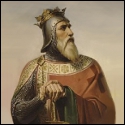|
I'm going to go for the irony angle and throw out Lodovico the Merciful.
|
|
|
|

|
| # ? Apr 25, 2024 05:05 |
|
AJ_Impy posted:Hmm. Tempting as poo poo-king is, I don't really feel he's on a par with the historical monarch who earned it by running away and forfeiting his kingdom, attempting to win it back by a war in another kingdom which he also ran away from, and dying in exile. At least this one fought! Wow, who was that?
|
|
|
|
Readingaccount posted:Wow, who was that? One of the innumerable James' of Scotland and England. Specifically the second of England and Seventh of Scotland (as AJ_impy mentioned), he was named this by the Irish after he ran away having gotten most of his own army killed through his own incompetence. There was another Emperor Constantine Copronymus who was apparently so named because his enemies claimed that he shat in the Baptismal font.
|
|
|
|
Chapter Forty-Two: The Meaning of Death (1421-1430) Lodovico bears many unfortunate epithets in Sicily, but the most common is also the simplest – Lodovico the Bad.  Alessandro immediately sets about attempting to undo the many errors of his brother’s reign. To begin with, he releases and pardons those that are still imprisoned, including his only remaining paternal uncle, Alessandro of Spoleto.  The many titles stripped by Lodovico are handed out – in some cases restored to their previous owners, in others given to those Alessandro knows to be loyal.  These actions win Alessandro immediate popularity among the nobility. There is a sense, however, that the feudal system of the past centuries – never as strong in Sicily as elsewhere in Christian Europe – is in a state of inevitable decline.  Alessandro dedicates the early years of his reign to the restoration of order in Sicily.  Slowly, his kingdom begins to recover.  Wary of putting Sicily in a position where it might be obligated to intervene in a foreign war, Alessandro looks far beyond the Mediterranean for a bride. He settles on Xenia Rurikovich, daughter of the Prince of Kiev.  Queen Xenia, who quickly convents to Catholicism, is an intelligent young woman, though she has some difficulty adapting to Sicilian culture.  With the sudden death of the young Duke of Mallorca, the islands pass to the Duke of Salerno. They are reincorporated into the Sicilian realm almost two centuries after having left it.  Less pleasant is news that Kaiser Thomas is to be officially crowned by the Pope. Still bitter over the invasion of Italy and the death of his brother, Alessandro refuses the emperor passage through his realm, forcing Thomas to sail to Rome from Provence instead.  As the Queen acclimates herself to life in Palermo, her relationship with Alessandro grows to one of love. Known in his youth as a handsome womanizer, Alessandro suddenly becomes the model of chastity. Before long he is known as Alessandro the Chaste.  After her first pregnancy, the Queen gives birth to a healthy daughter. The royal couple waste to time in conceiving a second child.  But there is a threat to Alessandro’s marital bliss – a call for help from the King of Serbia and Nicaea, whose latter realm has finally come under threat from the Maidarids. Reluctant to leave his young family and wary of throwing his still-recovering realm into a massive war, Alessandro refuses. He hopes that the rest of the Catholic coalition will be enough to finally defeat the eastern invaders.  When his son is born, Alessandro is sure he made the right decision.  In celebration of the boy’s birth, Alessandro revives his claim to the title King of Sardinia, it having never been officially declared since the division of the realm under his namesake, Emperor Alessandro.  The whole Catholic world continues to have its eyes on Anatolia, where it will finally be seen if the Maidarids truly are unstoppable. The war is going poorly, however, and finally the Serbian King is forced to make peace.  The peace is devastating. Nicaea is lost and the Maidarids sit at the gates of Constantinople. Horrified, Alessandro can’t help but blame himself, wondering if Sicilian arms could have made a difference.  Later, when a smallpox epidemic hits Sicily, some begin to say that God feels the same way.  While Alessandro, his wife, and their son remain safe, their three daughters all contract the disease.  Eventually Princess Ricciarda passes away, devastating the royal family.  Even when the epidemic passes, there is more misfortunate awaiting the king, as his youngest daughter, only recently having recovered from smallpox, contracts pneumonia and dies. Even the sceptical Alessandro begins to wonder if he is suffering divine punishment. 
|
|
|
|
The Maidarids are doing God's good work, bringing the light and blessing of Pretty Borders to Anatolia while smiting the heretic Serbians for their sinful ways.
|
|
|
|
We still have a male heir, quickly defend the faith under the next attack. Which I'm guessing will be Jerusalem.
|
|
|
|
RabidWeasel posted:The Maidarids are doing God's good work, bringing the light and blessing of Pretty Borders to Anatolia while smiting the heretic Serbians for their sinful ways. Yeah, now do Trebizon.
|
|
|
|
Lodovico the poo poo-King was the clear winner, this is the true cause of God's wrath
|
|
|
|
There will soon be a Khan in Constantinople. I hope they rename the city.
|
|
|
|
QuoProQuid posted:There will soon be a Khan in Constantinople. Khanstantinople perhaps?
|
|
|
|
Van5 posted:Khanstantinople perhaps? Khansas City?
|
|
|
|
Chapter Forty-Three: The Last Crusade (1431-1438) Eventually, the opportunity for Alessandro’s redemption arrives in a terrible form. Maidar Khan finally turns his attention to the Kingdom of Jerusalem itself.  King Raymond of Jerusalem pleads with the rest of the Christian world for help, desperate to avoid the fate of Nicaea.  Alessandro answers with an enormous army – every man Sicily can afford to send, including the king himself.  The army quickly sets about expelling the first Maidarid forces from Jerusalem’s borders, taking a smaller Mongol army by surprise  It is a slaughter. The vaunted Maidarid military might appears to have been greatly exaggerated.  Fresh off the victory, the Sicilians are ready for a greater challenge – a much larger Mongol army poised to advance on Jerusalem itself.  When the armies meet, however, the Sicilian commanders are horrified to discover that this army is being led by the legendary Maidar himself.  What results is the Battle of Pella – the deadliest battle in Sicilian history to date. The Sicilian army fights bravely and well, and the Maidarid casualties are greater than their own. But it is unquestionably a defeat.  The army crippled and many prominent Sicilian nobles dead, the commanders decide to retreat to the northern front and let newly-arrived reinforcements from Egypt defend the holy city. In the north they meet the troops of Maidar’s Syrian vassal-khan.  The battle goes well until the king himself is badly wounded.  Dizzied by blood loss and desperately trying to escape the fray, Alessandro is cut down by Mongol arrows – dying in the same manner as his brother.  With the king dead, command of the expedition falls to the Duke of Carinthia. Realizing the pointlessness of continuing to fight with his tired, ragged remnant of an army, he makes the decision to abandon the war and return to Sicily and his new liege, King Alessandro III.  News of the king’s death reaches Palermo long before the army’s return, however, and a regency council forms.  At its head is an unlikely figure – the mayor of Mazara, a commoner with uncommon political skill. This is naturally to the chagrin of the nobles returning from Jerusalem, including the Duke of Carinthia. It is yet another sign of the steady decline of the feudal system in Sicily.  Once again, the realm is in a poor state. The casualties of the ill-fated defense of Jerusalem are disastrous, and it will be years before Sicily will be capable of fielding an army as large as the one that sailed to the Holy Land. The threat of another foreign invasion – or another large rebellion – has re-emerged.  It is decided that the king’s younger brother shall be made Duke of Verona, despite his young age, in order to keep as much of the kingdom as possible loyal to the crown.  In part due to the Maidarid threat, there is a resurgence of violence against non-Christians in many European countries. Jewish communities suffer badly under the strange belief that they are complicit with the Maidarids in some way. The Sicilian crown continues its strong policy of toleration, however, and accepts refugees expelled from their countries of origin.  The war in Jerusalem naturally continues despite Sicilian withdrawal. In April of 1438, the armies of the King of Egypt strike a blow for Christendom when Maidar himself finally perishes in battle. Fittingly, however, the khan still manages to win the battle from beyond the grave.  The death of Maidar does not end his horde’s threat, however. Khuyildar, the eldest son of the khan and a legendary commander in his own right, is the unanimous choice for leadership, winning the support even of his younger brother Aguchu due to his lack of sons, which ensures that leadership will pass to Aguchu upon Khuyildar’s death.  In Sicily, the regency council continues to conflict with regional interests, particularly in the north. One of its strongest critics is the Doge of Pisa, who desires more autonomy and less taxation for the vassal republic. His demands are refused.  Finally, the conflict reaches a breaking point when it is discovered that the Duke of Carinthia is plotting against the regency council and planning to seize the control of the king – and thus the kingdom – by force.  The Duke escapes the attempts to arrest him, however, riding back to Carinthia to take up arms against the crown.  Unsurprisingly, he is joined by other disgruntled vassals. They sense the decline of their own power in relation to the king’s court at Palermo.  The rebellion is particularly strong in the north, further from the capital. Though only a few major lords rise up against the king, the severely weaken state of Sicily’s levies means that any rebellion is a threat. Yet again, Sicily finds itself in a dangerous civil war. 
|
|
|
|
Sounds like it's time to stab the war away, then. Unless this type of war can't be ended by the death of the guy who started it.
|
|
|
|
|
Viscardus posted:
Well it looks like the Maidarids aren't going anywhere for a while if Aguchu is anything like his older brother. Out of curiosity, what's the religious map like? Has much of the east converted to Buddhism?
|
|
|
|
forkis posted:Well it looks like the Maidarids aren't going anywhere for a while if Aguchu is anything like his older brother. Out of curiosity, what's the religious map like? Has much of the east converted to Buddhism? Yes, most of Persia has and a bunch of other random provinces have as well. Like I've said before, though, the religion map in CK2 is basically "non-canon" for the LP, because I'll be recreating it pretty much entirely during the conversion so that it actually makes some degree of sense. I'll show everyone the final CK2 religion and culture maps when we finish CK2, though, just for fun.
|
|
|
|
Well if Serbia-Nicaia-Lombardia could not stop the Maidarids I think it's only a matter of time because all of Europe falls.
|
|
|
|
Chapter Forty-Four: On the Brink (1439) The loyalist forces in the north immediately begin to march, hoping to put down the rebel armies before they can consolidate themselves.  In Benevento, the army quickly sets about repelling the rebel invasion of the south.  The rebellion is a threat in and of itself, but it is made far worse when word reaches Sicily that King Baldovino of Africa is planning to use the opportunity to invade the embattled kingdom. His goal is said to be nothing less than the crown of Sicily itself.  With the expected African invasion, the civil war takes on added urgency. The southern loyalist army marches toward Ancona, where they meet the Spoletan army outside the city of Pesaro.  It is a victory, but a costly one. Nevertheless, the war appears to be going well.  As the northern loyalists march to join the siege of Ancona, they are ambushed by a large Serbian force, who have joined the African invasion – as revenge, some say, for Sicily’s failure to join the defense of Nicaea.  The Battle of Cesena is a terrible defeat for the Sicilians. The northern army is effectively destroyed.  The north is defenseless, overrun by rebel and Serbian armies alike.  Worse, African armies have landed on Sicily and lain siege to Palermo itself.  There is no choice but to engage in the same strategy used by Bad King Lodovico – the treasury is emptied, hiring any mercenary who will fight for the Sicilian crown.  The remnants of the army, now bolstered by mercenaries, travel to Messina to make preparations to lift the siege of Palermo. Hoping the strike before the new army can organize itself, the Africans attack.  The mercenaries prove their worth, crushing the enemy army.  News of the victory bolsters the defenders of Palermo, who rally to hold off the besiegers a little longer.  Word from the north is much less positive now that the loyalists have effectively abandoned it. Treviso is one of the first major cities to fall.  The mercenary army continues its campaign by marching west and crushing the siege of Palermo.  Finally, they destroy the last African army on Sicily, led by the king himself. King Baldovino escapes, however, paying a fortune to have himself smuggled back to Tunis on a fishing boat.  Yet again, good news in the south is followed by bad news from the north, where Modena is the next city to fall to the rebels.  With his invasion having ended in disaster, King Baldovino agrees to peace, though he refuses to formally renounce his claim to the Kingdom of Sicily. For now, though, that is good enough for Sicily. 
|
|
|
|
I'm amazed the HRE hasn't invaded by now.
|
|
|
|
Given that your army was at half morale at the start of the battle this massacre was a really, really lucky break. 
|
|
|
|
YF-23 posted:Given that your army was at half morale at the start of the battle this massacre was a really, really lucky break. The hilariously incompetent African generals probably helped.
|
|
|
|
Motion to rename Lodovico to Lodovico the Prophet. He was completely right, kill them all!
|
|
|
|
YF-23 posted:Given that your army was at half morale at the start of the battle this massacre was a really, really lucky break. To be fair, if you compare the martial skills of the commanders in the earlier screenshot it wasn't so much luck as written from the start. The best African commander had 5 for martial, while the worst mercenary leader had 16. No problem that can't be solved with a big bag of cash.
|
|
|
|
So wait, was the Maidarid invasion of Jerusalem a success?
|
|
|
|
Raserys posted:So wait, was the Maidarid invasion of Jerusalem a success? It's still ongoing. You'll see the result in the next update, which is also the final one (not including the final State of the World update) for CK2.
|
|
|
|
Alessandro redeemed his treachery by fighting and dying heroically in battle in defense of the Holy Land. He will surely meet his ancestors in heaven with pride.
Readingaccount fucked around with this message at 11:24 on Jan 5, 2014 |
|
|
|
Man, even if Jerusalem is overrun by the Maidarids, they ought to at least have a fighting chance at reappearing in EU4-- this Jerusalem was far less ephemeral than the historical Jerusalem, helped in part by the great Sicilian realm but also on their own for decent stretches of time.
|
|
|
|
What do Buddhists want with Jerusalem anyway? It's only a holy city to Abrahamic religions...
|
|
|
Danny Glands posted:What do Buddhists want with Jerusalem anyway? It's only a holy city to Abrahamic religions... It's land. Land is good. Plus, it's taking out a potential competitor early while they're still strong.
|
|
|
|
|
Danny Glands posted:What do Buddhists want with Jerusalem anyway? It's only a holy city to Abrahamic religions... It's a place that isn't Buddhist.
|
|
|
|
Plus, I want the toy those other children are fighting to own.
|
|
|
|
e X posted:Motion to rename Lodovico to Lodovico the Prophet. He was completely right, kill them all! I wish we could rename Locovico Bad King Urgrain.
|
|
|
|
Danny Glands posted:What do Buddhists want with Jerusalem anyway? It's only a holy city to Abrahamic religions... Didn't Maidar Khan claim to be Buddha reborn or something like that? AKA the War for Jerusalem is as much a war of Prestige as a war of Piety, with the city itself being one of the most holy sites of the Abrahamic heathens sacking it would be a enormous blow to the Abrahamic religions.
|
|
|
|
Luhood posted:Didn't Maidar Khan claim to be Buddha reborn or something like that? AKA the War for Jerusalem is as much a war of Prestige as a war of Piety, with the city itself being one of the most holy sites of the Abrahamic heathens sacking it would be a enormous blow to the Abrahamic religions. Specifically, he claims to be an incarnation of Maitreya (hence the name "Maidar", which is presumably not his birth name).
|
|
|
|
Chapter Forty-Five: The Two Crowns (1440-1442) With the African invasion defeated, the Sicilian army sails north, hoping that the rebels can still be dislodged. En route, however, an unexpected storm hits, sinking several ships and drowning hundreds of men.  The army is largely unscathed, though, and the poor omen is quickly forgotten after the first battle of the new campaign, in which the Carinthian army is annihilated at Bassano.  Maintaining the mercenary army is expensive, meaning that the rebels must be put down as quickly as possible. As such, the army marches south immediately to confront the Pisans.  They meet at the Battle of Castel Guelfo, where the Pisans are completely outnumbered and easily defeated.  More importantly, the Pisan Doge is among those killed during the battle.  The army wins another victory at the Battle of Tresigallo, and it begins to feel like the tide is turning in favour of the loyalists despite their ever-decreasing funds.  Eventually Treviso is retaken, helping to undo much of the rebels’ progress.  Good news on the home front is followed by bad news abroad, though. The Kingdom of Jerusalem has finally fallen to the Maidarids.  With the rebel armies defeated and their sieges lifted, the kingdom seems largely safe. On the other hand, there is no money left to pay for mercenaries and the rebel strongholds are still untouched.  Rather than finish the rebels off on the field of battle, peace will have to be won at the negotiating table. A temporary peace is agreed to until the rebel grievances can be properly heard.  Though only 16, the young king insists on taking the lead in the negotiations, deciding that he no longer needs the help of the regency council that allowed the rebellion to occur in the first place.  A quiet but good-natured young man, King Alessandro is not the most intelligent ruler, but does possess a firm sense of morality.  The king steadfastly refuses the rebel proposals for greater autonomy and restored feudal privileges, recognizing that the era of powerful feudal lords is coming to an end, and that further concessions will significantly weaken Sicily. Instead, he proposes a bold compromise – the separation of the Kingdom of Lombardy from the Sicilian crown under the rule of his trusted younger brother Cesare.  Eventually, the rebels agree to the compromise, satisfied to become part of a smaller realm with a slightly weaker crown. The Republic of Pisa, however, is allowed to its independence.  Much to the chagrin of the Duke of Sardinia, he is not included in the new kingdom. Without the support of his fellow rebels, however, he is in no position to object. Further west, the Baleares define the western limit of Sicilian power.  In the east, Cyprus still remains under Sicilian rule. It is one of the easternmost Christian outposts in the Mediterranean, next to the Latin Empire’s outpost in Tripoli, to which the exiled King of Jerusalem has fled.  But the heart of the Sicilian kingdom remains the same territories conquered by Robert Guiscard all those centuries ago. And yet it can hardly be said that Sicily is in the same position it was then. Palermo is the cultural and economic heart of the Mediterranean, and the Sicilian realm is among the strongest and wealthiest in Europe. Perhaps most importantly, the d’Hauteville dynasty has spread across the Mediterranean, taking Siculo-Norman influence with it. The last four centuries have been defined by Sicilian power, and though the world is changing, the future looks bright for the kingdom in the sun. 
|
|
|
|
Bravo. We are going into EU4 in a strong but hardly dominant position. The best sort of position.
|
|
|
|
It is Mediterranean games like this that really make me wish EU4's overseas system was different. Any land Sicily gains on the African Coast or the Levant are almost worthless except for trade reasons. I really like this let's play and am glad to see it continue.
|
|
|
|
I have the opposite opinion of Patter Song - it feels like you're trying way too hard to justify crippling yourself, and that you're going to end up running an EU4 game where we're too small to really play with any of the big dogs. Especially with the huge Buddha-king empire that is likely going to either be amazing from pure size, or explode on itself and be terrible due to tech penalties. It doesn't seem particularly interesting to watch you go 'oh yeah, we gained land. We lost land. Now we're in EU4. We can't do anything' Hopefully I'm wrong about how our position in EU4 will be.
|
|
|
|
KittyEmpress posted:I have the opposite opinion of Patter Song - it feels like you're trying way too hard to justify crippling yourself, and that you're going to end up running an EU4 game where we're too small to really play with any of the big dogs. Especially with the huge Buddha-king empire that is likely going to either be amazing from pure size, or explode on itself and be terrible due to tech penalties. The CK2-EU4 converter takes into account tech and province improvements when converting. Sicily may not be geographically big, but it's been the center of one of the most powerful states in Europe for centuries and as such is going to have very, very rich provinces in EU4.
|
|
|
|
KittyEmpress posted:I have the opposite opinion of Patter Song - it feels like you're trying way too hard to justify crippling yourself, and that you're going to end up running an EU4 game where we're too small to really play with any of the big dogs. Especially with the huge Buddha-king empire that is likely going to either be amazing from pure size, or explode on itself and be terrible due to tech penalties. We will have either 13 or 16 provinces in EU4 (depending on whether or not Tunis is part of us or is spun off into its own thing). Some of those provinces (the two on Sicily proper, Naples, and Cyprus) are very, very good.
|
|
|
|

|
| # ? Apr 25, 2024 05:05 |
|
The Maidarids' implosion is going to be glorious to watch, what with their zero same-religion provinces outside of maybe Central Asia. And Sicily'll be fine in EU4. Centralized, rich, and perfectly positioned to take advantage of trade in the Mediterranean.
|
|
|


































